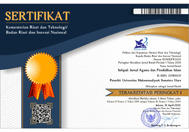Active Learning Strategy in Islamic Religious Education for Strengthening Student Character at MTs Masalikil Huda
Abstract
The purpose of this study is to analyze the implementation of active learning strategies and identify the barriers that arise in its implementation. This adopting a qualitative research paradigm, this study implements a case study approach, with interview techniques serving as the primary data collection method, observations, in addition to archival research. The project findings reveal that active learning strategies have the potential to increase students' participation, although there are some challenges such as resistance from teachers and limited facilities.
Keywords
Full Text:
PDFReferences
Almuhajir, A. (2022). Conflict Management: Building the Dynamics of Leadership in Islamic Educational Institutions. Development: Studies in Educational Management and Leadership, 1(1), 21–38. https://doi.org/10.47766/development.v1i1.648
Alonso-Nuez, M. J., Gil-Lacruz, A. I., & Rosell-Martínez, J. (2021). Assessing evaluation: Why student engages or resists to active learning? International Journal of Technology and Design Education, 31(5), 1001–1017. https://doi.org/10.1007/s10798-020-09582-1
Andayani, T., & Madani, F. (2023). Peran Penilaian Pembelajaran Dalam Meningkatkan Prestasi Siswa di Pendidikan Dasar. Jurnal Educatio FKIP UNMA, 9(2), 924–930. https://doi.org/10.31949/educatio.v9i2.4402
Aseery, A. (2024). Enhancing learners’ motivation and engagement in religious education classes at elementary levels. British Journal of Religious Education, 46(1), 43–58. https://doi.org/10.1080/01416200.2023.2256487
Azmia, I., & Fanreza, R. (2024). Implementasi Media Interaktif Games Digital Dalam Meningkatkan Kualitas Hasil Belajar Pendidikan Agama Islam di SMP An-Nizam. Al-Ulum: Jurnal Pendidikan Islam, 5(2), 2723–5459. https://doi.org/10.56114/al-ulum.v5i2.11643
Baidlowi M. Z., M. A., & Giyoto, G. (2024). Pembelajaran Terintegrasi Pendidikan Agama Islam Di Smp Islam Terpadu Syakur Al Marzuqi. Journal on Education, 6(4), 21170–21189. https://doi.org/10.31004/joe.v6i4.6035
Berliana Alvionita Pratiwi, Sumiyadi, S., & Rudi Adi Nugroho. (2024). Pembelajaran Diferensiasi Berbasis Proyek untuk Pengembangan Keterampilan Menulis Cerita Pendek di SMP. Jurnal Onoma: Pendidikan, Bahasa, Dan Sastra, 10(3), 2998–3009. https://doi.org/10.30605/onoma.v10i3.4035
Castilla-Polo, F., Ruiz-Rodríguez, M. C., Moreno, A., Licerán-Gutiérrez, A., de la Fuente, M. C., Rufián, E. C., & Cano-Rodríguez, M. (2020). Classroom learning and the perception of social responsibility amongst graduate students of management accounting. Sustainability (Switzerland), 12(17), 1–22. https://doi.org/10.3390/su12177093
Cavazos, J. T., Stern, W., Stephenson, E., & Heddy, B. (2021). Myth-Busting With Infographics: Do Creative Assignments Help Students Learn? Teaching of Psychology, 48(2), 117–123. https://doi.org/10.1177/0098628320977269
Dewi, W. T., Maryati, M., & Permana, H. (2022). Strategi Penanaman Nilai-Nilai Religius Peserta Didik Pada Era Revolusi Industri 4.0 di SMP N 1 Sukakarya Kabupaten Bekasi. Intiqad: Jurnal Agama Dan Pendidikan Islam, 14(2), 351–363. https://doi.org/10.30596/10597
Elmi, C. (2024). Fostering students’ inquiry aptitudes and collaborative reasoning in higher education science courses with social annotation tools and collaborative platforms. School Science and Mathematics, January 2023, 1–10. https://doi.org/10.1111/ssm.18316
Fikri, N., Azzaki, S., Dimas, M., Rohman, A., & Afandi, M. F. (2025). Strategi Guru Dalam Mengintegrasikan Pendidikan Karakter Melalui Kurikulum Pendidikan Agama Islam. NAAFI: JURNAL ILMIAH MAHASISWA, 2(1), 23–31. https://doi.org/10.62387/naafijurnalilmiahmahasiswa.v2i1.109
Irwan, I., Agus, J., & Saputra, J. (2022). Penanaman Sikap Tanggung Jawab dan Kepedulian melalui Pembelajaran PKn di Sekolah Dasar. Jurnal Basicedu, 6(6), 9264–9273. https://doi.org/10.31004/basicedu.v6i6.3722
Kamaruddin, I., Suarni, E., Rambe, S., Rachman, R. S., & Kurniadi, P. (2023). PENERAPAN MODEL PEMBELAJARAN BERBASIS PROYEK DALAM PENDIDIKAN: TINJAUAN LITERATUR. Jurnal Review Pendidikan Dan Pengajaran, 6(4), 2742–2747. https://doi.org/10.31004/jrpp.v6i4.22138
Kasi, R. (2022). Pembelajaran Aktif : Mendorong Partisipasi Siswa. Jurnal Pembelajaran, 1(1), 1–12.
Kim, K. J. (2020). Project-based learning approach to increase medical student empathy. Medical Education Online, 25(1). https://doi.org/10.1080/10872981.2020.1742965
Kos, T. (2024). Enhancing Young Learners’ Peer Collaboration: Pedagogical Ideas for Language Teachers. TESOL Quarterly, 59(1), 541–551. https://doi.org/10.1002/tesq.3344
Lestari, E. S. (2019). Manajemen Pembelajaran Kooperatif untuk Siswa Sekolah Menengah Pertama. Media Manajemen Pendidikan, 2(2), 217. https://doi.org/10.30738/mmp.v2i2.5851
Lev-Ari, S., & Sebanz, N. (2020). Interacting With Multiple Partners Improves Communication Skills. Cognitive Science, 44(4). https://doi.org/10.1111/cogs.12836
Li, W. (2023). On the role of creativity in the application-oriented university students’ engagement and success. Heliyon, 9(6), e17374. https://doi.org/10.1016/j.heliyon.2023.e17374
Lisnawati, L., Kuntari, S., & Hardiansyah, M. A. (2023). Peran Guru dalam Penerapan Pembelajaran Berdiferensiasi untuk Menumbuhkan Minat Belajar Siswa pada Mata Pelajaran Sosiologi. As-Sabiqun, 5(6), 1677–1693. https://doi.org/10.36088/assabiqun.v5i6.4086
Merovci, S., & Cvetkova Dimov, B. (2024). Teacher Perceptions of Benefits and Constraints of Active Learning in the Primary School Context. European Journal of Teaching and Education, 6(3), 1–15. https://doi.org/10.33422/ejte.v6i3.1242
Mubarak, R., Eriza, F., & Lubis, A. S. A. (2024). Islamic Liberation in Human Responsibility as a Caliph on Earth. Pharos Journal of Theology, 105((5)), 1–11. https://doi.org/10.46222/pharosjot.105.512
Munawir, M., Putri, M., & Diasti, U. S. P. (2024). Urgensi Pendidikan Akidah Akhlak di Era Globalisasi. Jurnal Basicedu, 8(2), 1402–1410. https://doi.org/10.31004/basicedu.v8i2.7269
Naeem, M., Ozuem, W., Howell, K., & Ranfagni, S. (2023). A Step-by-Step Process of Thematic Analysis to Develop a Conceptual Model in Qualitative Research. International Journal of Qualitative Methods, 22(October), 1–18. https://doi.org/10.1177/16094069231205789
Näsström, G., Andersson, C., Granberg, C., Palm, T., & Palmberg, B. (2021). Changes in Student Motivation and Teacher Decision Making When Implementing a Formative Assessment Practice. Frontiers in Education, 6(May), 1–17. https://doi.org/10.3389/feduc.2021.616216
Pivač, S., Skela-Savič, B., Jović, D., Avdić, M., & Kalender-Smajlović, S. (2021). Implementation of active learning methods by nurse educators in undergraduate nursing students’ programs – a group interview. BMC Nursing, 20(1), 1–10. https://doi.org/10.1186/s12912-021-00688-y
Purwaningrum, S., Khoiroh, L., & Fani’mah, S. (2024). Efektivitas Model Pembelajaran Problem Based Learning dalam Meningkatkan Keaktifan Belajar Siswa pada Pembelajaran Sejarah Kebudayaan Islam. Allimna: Jurnal Pendidikan Profesi Guru, 3(01), 36–48. https://doi.org/10.30762/allimna.v3i01.2709
Putri, I. K., Aiqri, F. A., & Gusmaneli, G. (2024). Konsep Dasar Strategi Pembelajaran Aktif dan Implementasinya dalam Pembelajaran Pendidikan Agama Islam Ira Kurnia Putri Famela Annisa Ziqri Gusmaneli Gusmaneli Universitas Islam Negeri Imam Bonjol Padang menyenangkan . Salah satu kritik tersebut adalah ba. GURUKU: Jurnal Pendidikan Dan Sosial Humaniora, 2(2), 31–38. https://doi.org/10.59061/guruku.v2i2.635
Rahmawati, E. S., & Zainuri, H. (2024). Learning Methods for Islamic Religious Education in the Merdeka Curriculum. ISTIFHAM: Journal Of Islamic Studies, 02(3), 238–248. https://doi.org/10.71039/istifham.v2i3.69
Rock-Singer, A. (2022). The Rise of Islamic Society: Social Change, State Power, and Historical Imagination. Comparative Studies in Society and History, 64(4), 994–1023. https://doi.org/10.1017/S0010417522000317
Rogers, K. S., Thomas, C., & Holmes, H. (2024). Encouraging student participation in mathematical activities in synchronous online tuition. Open Learning, 39(3), 241–257. https://doi.org/10.1080/02680513.2021.1938523
Rogti, M. (2024). The Effect of Mobile-based Interactive Multimedia on Thinking Engagement and Cooperation. International Journal of Instruction, 17(1), 673–696. https://doi.org/10.29333/iji.2024.17135a
Sa, I., Rusdianti, A., & Putri, M. (2025). Integrasi Metode Pembelajaran Project Based Learning , Outcame Based Education , dan Bermain Peran dengan Model Webinar Mini untuk Meningkatkan Keterampilan Berbicara Mahasiswa. 11(1), 1021–1036.
Saefullah, A. S. (2024). Ragam Penelitian Kualitatif Berbasis Kepustakaan Pada Studi Agama dan Keberagamaan dalam Islam. Al-Tarbiyah : Jurnal Ilmu Pendidikan Islam, 2(4), 195–211. https://doi.org/10.59059/al-tarbiyah.v2i4.1428
Saragih, P., Sinurat, H., & Puspita Sirait, C. (2022). Peran Pendidikan Agama dalam Pembentukan Nilai Moral pada Anak-anak Sekolah Dasar. 2(1).
Umar, H., & Masnawati, E. (2024). Peran Lingkungan Sekolah Dalam Pembentukan Identitas Remaja. Jurnal Kajian Pendidikan Islam, 3(Fadlillah 2017), 191–204. https://doi.org/10.58561/jkpi.v3i2.137
Zubairi Muzakki, & Nurdin, N. (2022). Formation of Student Character in Islamic Religious Education. EDUKASIA: Jurnal Pendidikan Dan Pembelajaran, 3(3), 937–948. https://doi.org/10.62775/edukasia.v3i3.219
DOI: https://doi.org/10.30596/24198
Refbacks
- There are currently no refbacks.
Intiqad Jurnal Agama dan Pendidikan Islam is abstracting & indexing in the following databases:
View My StatsEditorial Address:
Faculty of Islamic Religion, Universitas Muhammadiyah Sumatera Utara. Jl. Mukhtar Basri No. 3 Medan 20238 Telp. (061) 6622400 ext. 27 dan 28 Fax. (061) 6625474. e-mail: intiqad@umsu.ac.id

_(1).png)
























